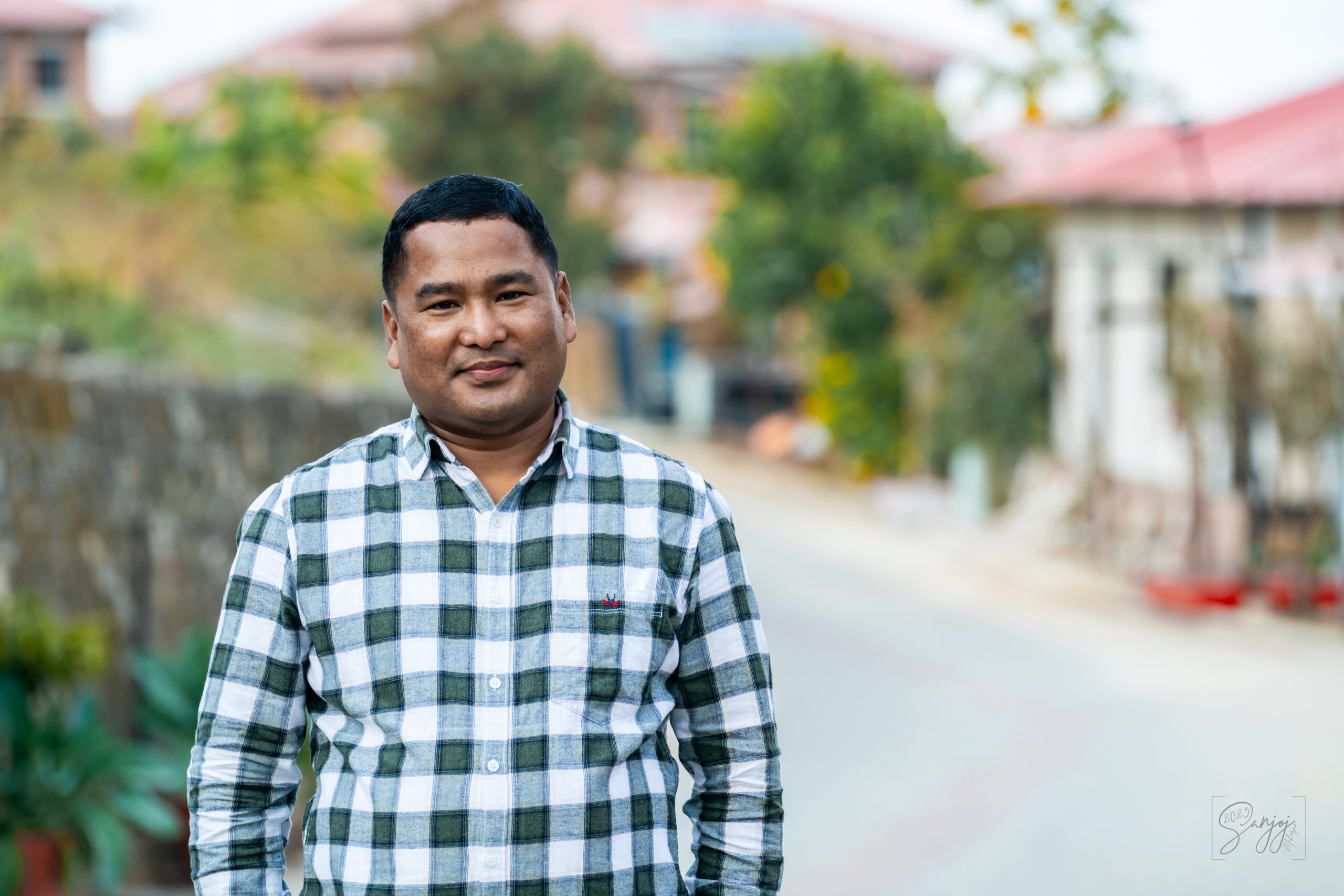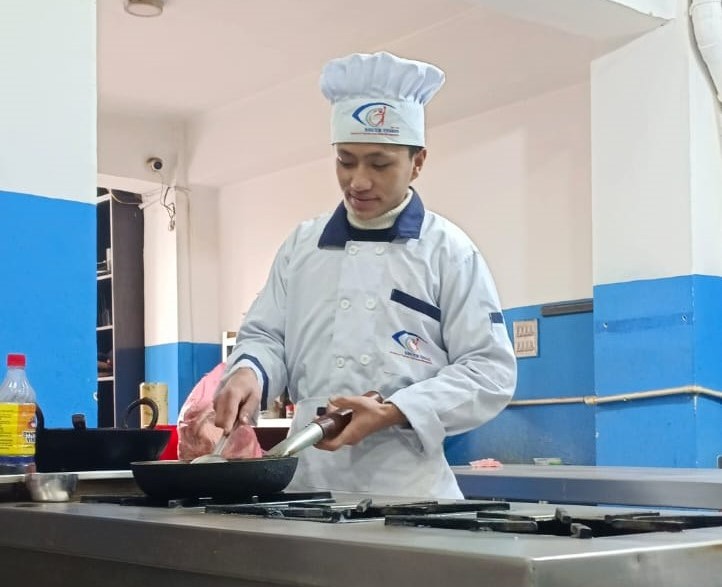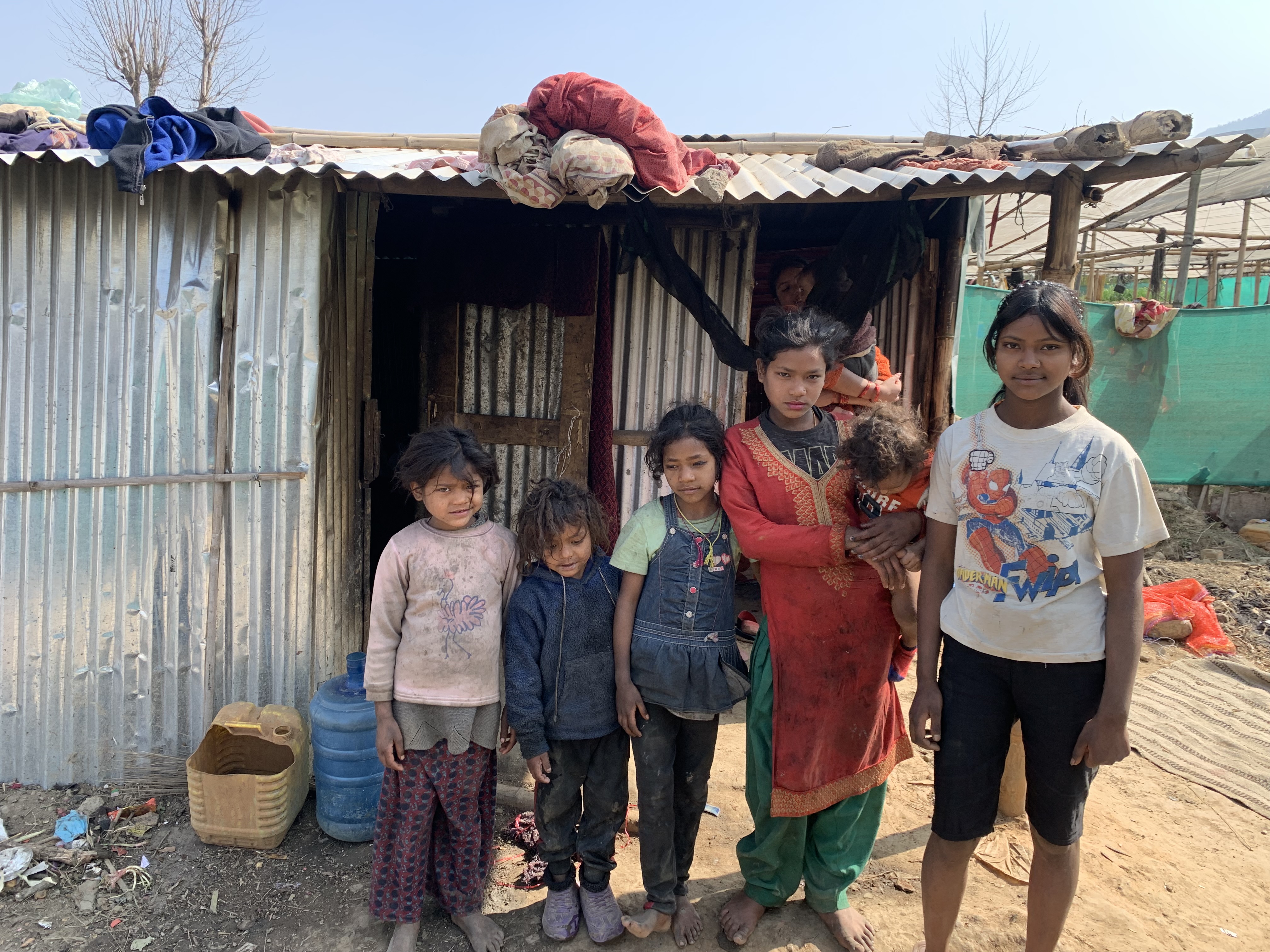Staff Spotlight: Ram Babu Rai

Ram Babu Rai: Kinship Care Program Officer & Technical School Scholarship Officer
In December 2023, Ram Babu Rai dropped in to check on Niraj*. Niraj is an NYF scholarship recipient who had recently completed culinary school. Niraj’s grandmother was overjoyed to welcome Ram Babu, proudly sharing stories of her grandson’s recent successes, including his wonderful new job in a Kathmandu hotel. Niraj was making more than enough money to cover all of his expenses. He had even bought his grandmother a gorgeous new sari as a gift. Beaming with joy, she placed the sari in Ram Babu’s hands so he could admire it. When Ram Babu looked up at Niraj, the young man smiled with a hard-earned confidence.

“This is the unique quality of NYF,” Ram Babu explains. “NYF takes a personalized approach. Each child is given support based on their actual needs rather than a blanket approach. We build a relationship with the children and families we serve and provide mentoring and guidance over the years. At the end of it, each individual child’s life is visibly transformed. We do not abandon children halfway.”
For children in NYF’s Kinship Care program and those receiving Technical School Scholarships, it is Ram Babu who builds and maintains that crucial relationship. He rarely has what one might call “office time”. Instead, he’s almost always out in the field, managing more than 250 individual cases at a time.
Ram Babu Rai’s Background
Ram Babu Rai comes from the Rai community, one of the oldest distinct ethnic minorities in Nepal. About 2.3% of Nepal’s population belongs to this group, mostly in eastern Nepal. Rai culture, languages, history, and traditions are unique—which has unfortunately resulted in “outsider” status within Nepal’s broader systems.
Growing up, Ram Babu lived in a small agricultural village in Nuwakot District, in the Himalayan foothills not far from Kathmandu Valley. Public education was not available for most children there, and it was given a very low priority by the community. When families could somehow afford to send children to school, they focused on educating their sons—never their daughters.
As in many rural communities throughout Nepal, arranged child marriage was very common in Ram Babu’s village, for both boys and girls. These marriages serve a complex purpose within the social network of the community, connecting families and forming the basis for close relationships into the future.
Ram Babu was only 14 when his parents arranged his marriage to Laxmi—and she was only 13. Both were too young to truly understand the impact such a marriage would have on their lives moving forward. “I don’t even recall my marriage,” Ram Babu says now. “But I still own a little coat from my wedding, reminding me how little I was at the time.”
The Realities of Child Marriage
At first, Ram Babu’s marriage didn’t change much about his life. His family was well-off enough to send him for an education, and his studies continued after his wedding. But as the years passed, Ram Babu realized that his experience and Laxmi’s experience were very different.
“While I was able to continue my education up to my bachelor’s degree,” he says, “my wife’s life was trapped in childrearing, household chores, and laboring in the farm.”
Laxmi was only 14 when they became parents for the first time, and the experience was devastating for her health. Neither of them had realized the long-term impact early childbearing could have, and Ram Babu was horrified. He was even more horrified to learn how common Laxmi’s experience was for girls and women in his community.
To this day, preventing child marriage is a deeply personal, important issue for Ram Babu—especially for girls. “I’m happy that at NYF I can work on something that is very close to my heart: preventing child marriage through education.”
Making a Change
Ram Babu’s education outside of his village opened his eyes to possibilities his community was missing. By the time he was a young adult, he had become one of the most educated people in the village—and he didn’t want to leave his community behind.
“These were my own family, uncles, aunts, and relatives,” he says. “I was pained by the utter poverty of my community. The condition of the girls was worst. They were oppressed and beaten and not given any opportunity. I felt that education and awareness would somehow help the community make any breakthrough from the current situation we were trapped in.”
Ram Babu and a few likeminded friends established a small private school right in their village. This opened up a new opportunity for local boys and girls. They didn’t have much, but they put everything they could into this venture. Ram Babu became one of the teachers.
That’s where Ram Babu Rai was working when he met Som Paneru and NYF in 2007.
Joining NYF
In 2007, NYF had heard about the situation for young girls in rural Rai communities. In response, we had sent a small team to explore the possibilities of starting an education program.
Som and the team were impressed to discover Ram Babu’s school in one of these villages. Ram Babu was thrilled at the idea of bringing in outside support to supercharge his goal of empowering Rai girls. When NYF confirmed they would be able to start an education program here, Som asked if Ram Babu would be interested in becoming NYF’s implementation leader on the ground. Ram Babu accepted, and he’s been with NYF ever since.
“We launched the Rai Girls’ Education program starting with 150 scholarships for girls in my village,” Ram Babu recalls. “We gradually expanded to other villages and supported over 300 girls. Besides scholarships, we built three schools in coordination with the local government, provided additional teachers, and ran teacher training to improve the quality of teaching and learning in the schools.”
In these early years, Ram Babu also oversaw new community centers where girls and women could access safe, trustworthy childcare while they attended classes or went to work. “These spaces became a hub for discussing social issues and raising awareness against early marriage and other harmful practices.”
He was also honored to take part in preserving parts of the Rai culture that were rapidly disappearing, collecting and documenting information with Nepal’s National Language Academy.
A Growing Career in Child Protection and Education
Ram Babu is particularly proud of a group of Rai girls who didn’t quite fit into the regular academic track. He instead enrolled them in vocational and technical training programs in areas like nursing and land surveying. “All these girls are now government employees,” he says. Before, Rai people were almost completely absent from these professions, and even from the government. “They call me sometimes to share news about their jobs or achievements,” Ram Babu says happily.
Ram Babu’s work at NYF expanded rapidly to encompass other village-based scholarship programs. He’s now in charge of the entire Kinship Care program as well as our Technical School Scholarship program, bringing highly personal attention to each of the 250+ individuals NYF serves each year.
“I follow up on each student physically at least once every three months,” he explains. “I visit their school, as well as their home and family, and even the local government offices if needed, ensuring that they are doing well and attending school regularly.” Some students have special medical conditions that require extra support—Ram Babu monitors these things as well, ensuring that each child’s Kinship Care stipend is appropriate and sufficient for their personal situation.
Ram Babu keeps careful records on each child, collecting receipts and school documents from each family, and taking calls whenever a student or caregiver needs his feedback or advice. He also assesses potential new cases, conducting thorough reviews of each unique situation.
Preventing Child Marriage
All along, Ram Babu’s 30-year relationship with his wife, Laxmi, has deepened into one filled with trust and mutual appreciation.
Early childbearing caused many lifelong health issues for Laxmi, including permanent damage to her kidneys. Both she and Ram Babu are glad she can access regular, good-quality medical treatment for these conditions. They are both eager to discourage other young people from walking the same path.
Despite the challenges, Ram Babu and Laxmi have raised three wonderful children. Their eldest son is now pursuing a master’s degree. Their two daughters are currently working on bachelor’s degrees—a tremendous generational triumph.
In early 2023, while assessing Kinship Care cases in a remote village not far from Ram Babu’s own hometown, he discovered a high rate of similar marriage traditions to those he knew growing up. “The Balami community (a very small ethnic minority) still practices early child marriage and forced marriage,” Ram Babu explains. “Boys are entitled to ‘kidnap’ girls they like and marry them by force.” Once these girls are married, they drop out of school. Most girls in this tiny community don’t make it past 5th grade before getting married or entering the workforce.
Ram Babu took it upon himself to conduct a more thorough assessment. He then recommended to the Kathmandu team that NYF create an enriched Kinship Care scholarship to protect them from these practices. “We’ve now launched a special scholarship program for Balami girls in Kagati Gaun,” he says proudly.
Now in its first year, this mini-program is providing enriched Kinship Care stipends for 15 girls at risk of early marriage due to their families’ economic situation. Parents know that if they allow their daughters to be “kidnapped” or send them to work, the stipends will cease. Ram Babu has established close communication with the local school and the village government to monitor the success of these scholarships in lowering the early marriage and school dropout rates. And he is hoping the project can grow.
Click the button below to make a donation to support this work – and more!
Revival of Hope
Ram Babu’s work is challenging, but very rewarding. “In the 17 years I have worked at NYF, I have never had a day that I felt like not going to work,” he says. Helping bring hope to an overwhelmed family is a special privilege.
“After we study a case and decide to take them in, we tell them about the support they will get: school fees, uniforms, books and stationary, health care, money for food and clothing, etc. It’s usually beyond their expectations and the news re-instills in them a hope for an easier life. I feel fortunate to witness this happiness first-hand.”

Lasting Impact & Community Recognition
Ram Babu loves his work—and he’s proud that the communities NYF serves are recognizing our impact as well.
One school, near a large slum area on the outskirts of Kathmandu, teaches a particularly high number of our Kinship Care students. These kids are the children of domestic laborers, factory workers, and others who make do by working important but grueling, thankless, and underpaid jobs because they have no other options. Kinship Care stipends allow these kids to stay in school, well-fed and properly clothed, while remaining in the loving care of their hardworking families.
The school serving these children recently honored NYF with an award for the work we are doing. Before NYF got involved with these communities, kids from this area frequently dropped out of school to help support their families. Schoolteachers described how many of these kids, disillusioned by how impossible it seemed to access any further opportunities, were never able to achieve their tremendous potential.
Now, thanks to Kinship Care stipends, many kids who originally faced similar prospects are becoming engineers, doctors, government employees, agriculturalists, and much more. And they’re bringing some of that success back to their families and greater communities.
Empowering Transformations, One Gift at a Time
Here are just a few ways your gift powers transformations for children & families in Nepal.
$25
provides 1 one-hour therapy session to a child learning vital emotional skills
$50
provides 20kg of Lito, a life-saving and highly nutritious super flour distributed to families
$300
covers the greenhouse build for a SAAET trainee in NYF's vocational training program
$850
keeps a child safe in a loving family member's home & in school for a year
$1,100
covers one year of living expenses, school supplies, and testing fees for a motivated college student




